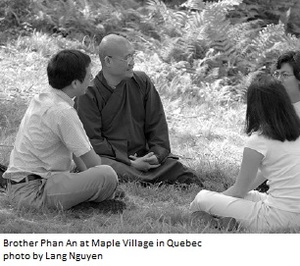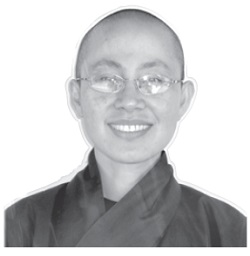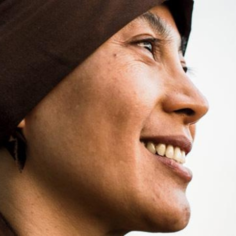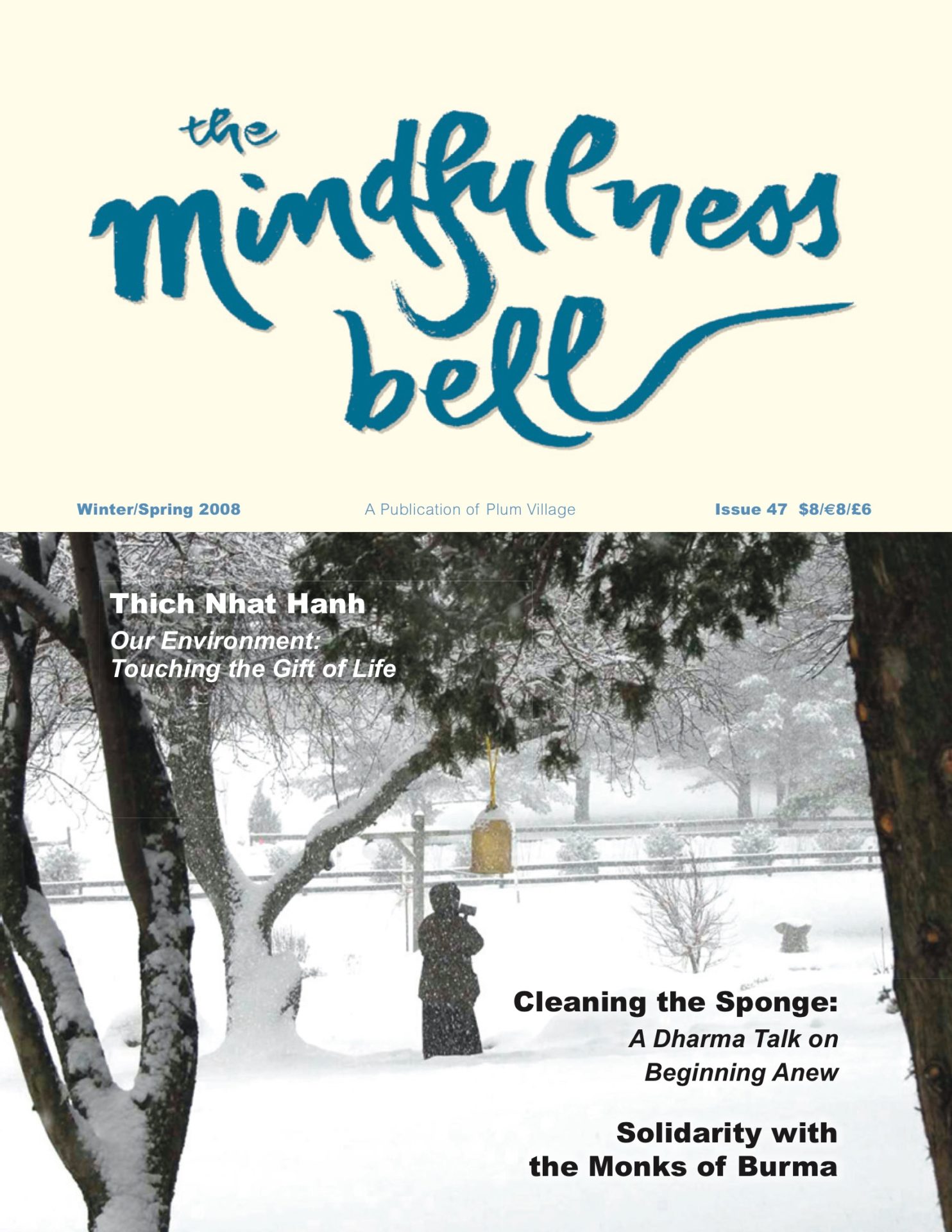A Dharma Talk on Beginning Anew
By Sister Dang Nghiem and Brother Phap An
By Sister Dang Nghiem in February 2008
At the Stonehill retreat in New York, two senior Dharma teachers teamed up to speak about the practice of Beginning Anew. This excerpt preserves some of the playfulness, humor, and depth of their presentation, which took place on August 15,
A Dharma Talk on Beginning Anew
By Sister Dang Nghiem and Brother Phap An
By Sister Dang Nghiem in February 2008
At the Stonehill retreat in New York, two senior Dharma teachers teamed up to speak about the practice of Beginning Anew. This excerpt preserves some of the playfulness, humor, and depth of their presentation, which took place on August 15, 2007.

Brother Phap An: Some of us have listened to Beginning Anew presentations quite a few times. If you’ve been to Thay’s retreats, every time we have a Beginning Anew presentation.
This time, the sangha asked me and Sister Dang Nghiem to do the Beginning Anew presentation — Sister Dang Nghiem, Adornment with Equality or Non-Discrimination and Brother Phap An, Dharma Seal, like the animal in the Atlantic. Actually it’s Dharma Seal like a stamp, the Dharma seal. So you can remember our names. (laughter)
The two of us met a few days ago, and I said that I’ve been doing presentations for a few years now, and every time I want to have Beginning Anew anew! What should we do about it? So tonight you will see a skit! Let’s see how it will evolve. (laughter)
This morning, in her talk, Sister Annabel mentioned a man working in the garage who turned to his wife and said, “I know that you must be suffering a lot. Please tell me about it.” This is a form of Beginning Anew. Let’s ask Sister Dang Nghiem what she thinks about that practice. What should we do before we make such a statement to our loved one? Please tell me.
Is the Sponge Clean?
Sister Dang Nghiem: I would ask, “Is the sponge clean?” (laughter)
Brother Phap An: What do you mean by “sponge”? (laughter) I don’t quite understand that term. Please explain! (laughter)

Sister Dang Nghiem: You know how we wash dishes every day? We use the sponge to clean the dishes. But how often do we think about whether the sponge is clean? Because if the sponge is not clean, the dishes will not be clean. (laughter)
We may be very eager to do Beginning Anew, but actually the first step is to come back and to do Beginning Anew with ourselves — to clean the sponge.
In our lives we often look for new things. If a pair of shoes is old, we get a new pair of shoes. If a pair of shoes is new but we don’t like them, we get another pair. Sometimes we do that with relationships. We can get another girlfriend or another boyfriend.
But how often do we do Beginning Anew with what we have, to see it fresh, to make it new, alive, and beautiful for us again? How often do we hear ourselves thinking the same thoughts and saying the same things, even sometimes those things we know will not bring more understanding and harmony? How often do we see that in our physical reactions we have very predictable patterns?
The practice of Beginning Anew starts with the sponge. It means that we begin anew with our own thoughts, our own speech, our own bodily actions.
Brother, how do we do Beginning Anew with our own thoughts? I think that’s the most difficult.
Lying Down with Anger
Brother Phap An: For me as a monk, the life of a practitioner is a life of practicing Beginning Anew every moment of daily life. That is my practice. The way I practice Beginning Anew is by returning to my breath. Breathing in, I know that I am breathing in. Breathing out, I know that I am breathing out. And then, breathing in, I’m aware of my whole body. Breathing out, I relax my body. That’s my practice of Beginning Anew with my physical body.
As a human being we often act like an automated machine. As soon as a button is pushed, we act in a certain way. To respond properly to any situation, the first practice is to stop. Awareness of breathing is very important; it helps us to stop.
I used to have a very hot temper. But now I have lower blood pressure! It took me a long time to practice stopping, but that is the training of a monk.
I remember one time there was a ceremony in the Upper Hamlet, a monks’ residence in Plum Village in southern France. That day the abbot of the hamlet asked some of us to hang a wooden plaque with Thay’s calligraphy and to prepare an ancestral altar. We discussed where to hang it, but the abbot was not there, he was busy; perhaps he was busy having tea. Thay Giac Thanh was the abbot at the time, a very dear brother, very kind, very Zen.
So we hung it up, and it was about noon when we took away the ladder, the drill, the hammer, all the tools. With his Zen master’s stick, the abbot came and walked through the meditation hall. He looked and said, “Well, the wooden plaque with Thay’s calligraphy doesn’t look nice over there. The altar should be in another place.” (laughter)
It was a Zen training, you know. Whenever you go to monastery and you have frustration, think of it as a training. (laughter)
When he came in and said we need to move it, my anger just came up like crazy. And you know what I did? As soon as he left, I lay on the floor, flat! Just like this. (demonstrates; laughter) So I lie on the floor, and I put my arms around me, and I begin to follow my breath. Breathing in, I know that I’m breathing in! (laughter) Breathing out, I know that I’m breathing out. And I feel the anger so strong, it wants to take me off the floor.
Breathing in, I know that I’m very angry. (laughter) Breathing out, I embrace my anger with all of my love! This is the real transmission for you tonight (laughter). When you are angry with your beloved, even if you are on a paved road, lie down. It’s the Zen way of practicing. (laughter) But make sure there’s no truck going by! (laughter)
Luckily I was able to lie down and embrace my anger. After five or ten minutes, I felt calmed down and I stood up, and went out to look for another brother so we could move the ancestral altar.
So my practice of Beginning Anew has very much to do with our daily life. The practice of walking meditation is the practice of Beginning Anew. The moment that we put one step on the floor, aware of the step, aware of our body, aware of the blue sky or our feeling, that is a wonderful practice of Beginning Anew.
My Sister Dang Nghiem said, “That’s the way to clean the sponge.” In every one of us there is a block of suffering. We are all born with a block of suffering, which has been transmitted to us by our ancestors, the way they lived, the way they acted, the way they talked with each other. They made each other suffer. As we grew up this block of suffering began to snowball. Beginning Anew is a practice of reversing the process of the snowball effect, to make that snowball smaller.
That’s the basis of the practice of Beginning Anew. Once we are able to have that calm and peace within us, then we can approach the other person.
Sister Dang Nghiem, how do you approach a sister when she’s angry with you? How do you practice Beginning Anew with her? After you clean your sponge, what do you do?
A Tale of Two Sisters
Sister Dang Nghiem: Well, actually the situation happened not very long ago. One sister came up to me, and as we were passing by, she gave me a note. She and I have been really close because we were aspirants together. We came as young lay women, and we played together and then we became ordained at the same time. So we are sisters in the same family.
Recently there was something that made us feel a little strange towards each other. Her note said something like this: “I’m ready, if you are ready, to talk to me about your anger towards me.” (laughter) I almost choked when I read that note! And then she walked away. On the way back, I was standing there and I said something to her. But first I have to give you a little bit of background or else it may shock you!
When I was young — my grandmother was the one to raise my brother and me — every time I tried to be a little bit philosophical or argumentative, my grandma just saw right through it and she would say, “You make me want to poop!” (laughter) That effectively deflated my ego.
So when my sister passed by me this second time, I said, “You make me want to poop!” (laughter) It’s loving speech between us.
She said, “Poop, so that you’re unblocked!” (laughter)
When she said that, I just kind of pulled her cone hat and kissed her on the cheek. And then she walked away.
It made me really happy in that moment. We could just be goofy together again. As the day proceeded, I thought, now I can go and talk to her. And then it came to me, no, I don’t want to go to talk to her, I’ll let her suffer! (laughter) I just didn’t want to go talk to her.
Even though in our precepts as monks and nuns we should not hold our anger for more than twenty-four hours, I wanted her to wait for a few days! But deep inside me, I was cleaning my sponge. I always do my best, because I know that I am very unskillful. I was very aware that I wanted revenge, but at the same time I was just smiling because I have always felt a lot of love for my sister. It was just a matter of time until we came to talk to each other.
When we did Beginning Anew there was a full moon, and she sat there and I talked to her. I said, “Actually, I am not angry at you. It’s not anger that you feel from me, but hurt. When you shared like that, it took me by complete surprise. I thought we knew each other, and now I hear that you cannot talk to me. I feel that you don’t understand me, and that’s what hurts me the most.”
She just listened, and I did the best I could not to blame her in any way but to explain how I felt. I also explained how I contributed to the situation. Because admittedly there were times when she tried to give me advice or something, and I didn’t want to hear it so I brushed it off. That was how we came to a point where she felt that I did not listen and that she could not speak to me.
At the end she said, “Now I don’t want to say anything, but it makes me feel lighter to hear you.” We did hugging meditation and I said, “Please forgive me for my limitations.” She said, “Don’t worry about it.” We walked away feeling a lot happier.
Beginning Anew, Anew
The interesting thing is that the awkwardness continued. Beginning Anew is not some kind of magic. Sometimes it works and the situation is resolved, but to me it’s a continual process.
It comes back to the sponge that has to clean itself. Deep inside us there are still thoughts and views, grudges or resentments or whatever. When we do Beginning Anew, it resolves to a certain level, but the deeper levels are still there. When the awkwardness between us was still there, I knew that deep inside me there are still other issues, as there are inside her. It takes a lot of patience and love.
I see that we have trust in each other because we want to make that commitment to live together as partners, as parents and children, or as brothers and sisters. We want our relationship to be healthy, to be beautiful, but at the same time we realize that it is a continual process, and it is very difficult. The best thing we can offer each other is our practice. We take responsibility for our sponge, and we give ourselves the space and time to constantly cleanse ourselves. We also give the other person the time and space to do that, because if we push ourselves or the other person when we’re not ready to do Beginning Anew, to share, or to go to a deeper level, then it becomes very awkward and unnatural, and it can even cause more damage. It’s really a process that is like a dance, and we learn to be sensitive to it.
I would like my brother to share a little bit about the process of Beginning Anew. We don’t jump in with what’s difficult because that would cause imbalance. We start with flower watering; we acknowledge what’s beautiful first. My brother is one of the best practitioners of flower watering! And I would like to know how, when you live with your brothers and sisters, year after year, how do you manage to see beautiful things in us and not just boring things?
Master of Flower Watering
Brother Phap An: Flower watering is the practice of looking deeply into the other person; you recognize his or her beauty and how that beauty offers love and support to your life. You need to say something sincere, and something that comes from your observation — not a form of flattery.
For example, just last night, my brother who is at the CD table brought in a sleeping bag for me. My body does not feel up to cold weather, and I have felt cold the last few days. The fact that he brought in the sleeping bag, materially, made me very warm, but his care and kindness also gave me a lot of warmth. So I’m watering the flower right now for him down there, at the CD table.
You don’t need to say, now I’m doing flower watering for you. You can do it very skillfully without revealing what you are doing, but people see and feel that you are watering their positive seeds. And that’s how I do it, Sister, to answer your question.
Don’t wait until the situation becomes difficult. If we do the flower watering then, it’s too late. We should learn to practice it in our daily life. It becomes a habit to see the goodness in the other person.
I think I have a very good seed from my ancestors, perhaps from my mom. My tendency is to look at the wholesome seed in the other person. It’s very rare that I look at the negative seed. My practice is to see everything that people do for me as something very wonderful. Every day I can water flowers all the time, all day long. So that’s the problem with me! (laughter) You see, when you do it too little, you have a problem. But when you do it too much, it becomes a problem, too. Many brothers and sisters just don’t trust my flower watering. (laughter) They say I am too professional! (laughter) And they don’t trust it. But I say it from my heart.
So my brothers and sisters gave me a very bad name: Master of Flower Watering. (laughter) There’s Zen Master, there’s Tea Master, and I’m Flower Watering Master! But the truth is I see good acts in all of my brothers and sisters. In very small acts, I appreciate them.
Your First Love
The key of the practice of Beginning Anew is to return and touch that deep love within you. When we have a relationship — with ourselves, with our environment, or with a partner or a friend — we approach it with that first love. When you come to a retreat the first time, you have that first love. Then when you come the second time, things become more familiar and somehow that first love begins to deteriorate a little bit, because we use the old experience to respond to the new situation. That’s our human tendency. We are like a machine, and we tend to act that way.
Beginning Anew is to lighten up, to turn to the first love that’s within us. I believe that in any relationship there is that first love. The first moment that you touch the earth and do that first step in walking meditation, that is your first love. If you practice for some time and you don’t get happiness from it, you don’t get much joy from it, then that love is beginning to deteriorate.
When a relationship becomes less nourishing, less joyful, less happy, then that first love is withering away. Beginning Anew is to go back and to touch that love one more time. In my sister’s language, it is to clean our sponge, to clean that sponge so that the first love reveals itself again.
Transcribed by Greg Sever, edited by Janelle Combelic and Barbara Casey.

The Practice of Beginning Anew
From the Deer Park Monastery Website
To begin anew is to look deeply and honestly at ourselves, our past actions, speech and thoughts, and to create a fresh beginning within ourselves and in our relationships with others. At the practice center we practice Beginning Anew as a community every two weeks and individually as often as we like.
We practice Beginning Anew to clear our mind and keep our practice fresh. When a difficulty arises in our relationships with fellow practitioners and one of us feels resentment or hurt, we know it is time to Begin Anew. The following is a description of the four-part process of Beginning Anew as used in a formal setting. One person speaks at a time and is not interrupted during his or her turn. The other practitioners practice deep listening and following their breath.
1. Flower watering
This is a chance to share our appreciation for the other person. We may mention specific instances that the other person said or did something that we admired. This is an opportunity to shine light on the other’s strengths and contributions to the Sangha and to encourage the growth of his or her positive qualities.
2. Sharing regrets
We may mention any unskillfulness in our actions, speech, or thoughts that we have not yet had an opportunity to apologize for.
3. Expressing a hurt
We may share how we felt hurt by an interaction with another practitioner, due to his or her actions, speech, or thoughts. (To express a hurt we should first water the other person’s flower by sharing two positive qualities that we have truly observed in him or her. Expressing a hurt is often performed one on one with another practitioner rather than in the group setting. You may ask for a third party that you both trust and respect to be present, if desired.)
4. Sharing a long-term difficulty & asking for support
At times we each have difficulties and pain arise from our past and surface in the present. When we share an issue that we are dealing with we can let the people around us understand us better and offer the support that we really need.
The practice of Beginning Anew helps us develop our kind speech and compassionate listening. Beginning Anew is a practice of recognition and appreciation of the positive elements within our Sangha. For instance, we may notice that our roommate is generous in sharing her insights, and another friend is caring towards plants. Recognizing others’ positive traits allows us to see our own good qualities as well.
Along with these good traits, we each have areas of weakness, such as speaking out of anger or being caught in our misperceptions. When we practice “flower watering” we support the development of good qualities in each other and at the same time we help to weaken the difficulties in the other person. As in a garden, when we “water the flowers” of loving kindness and compassion in each other, we also take energy away from the weeds of anger, jealousy, and misperception.
We can practice Beginning Anew every day by expressing our appreciation for our fellow practitioners and apologizing right away when we do or say something that hurts them. We can politely let others know when we have been hurt as well. The health and happiness of the whole community depends on the harmony, peace and joy that exists between every member in the Sangha.


